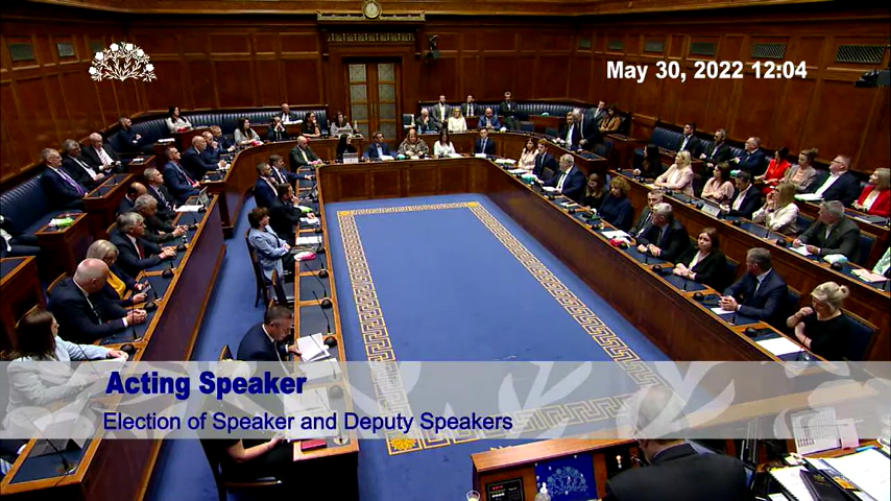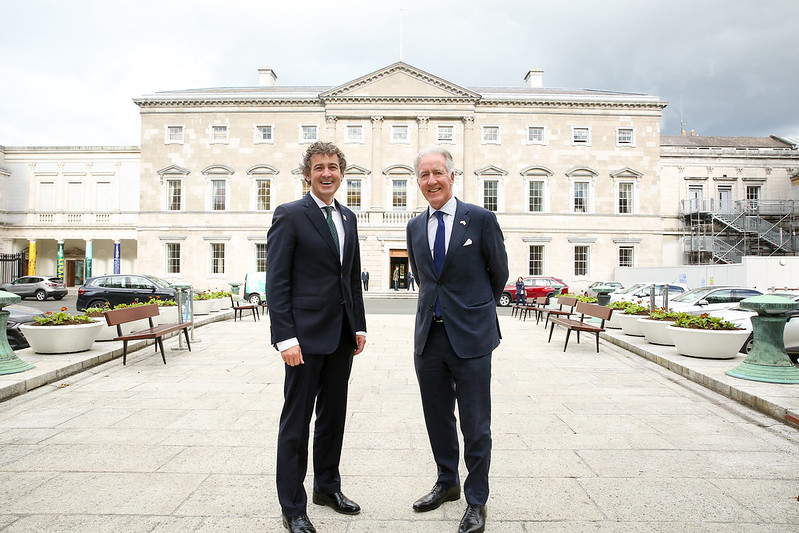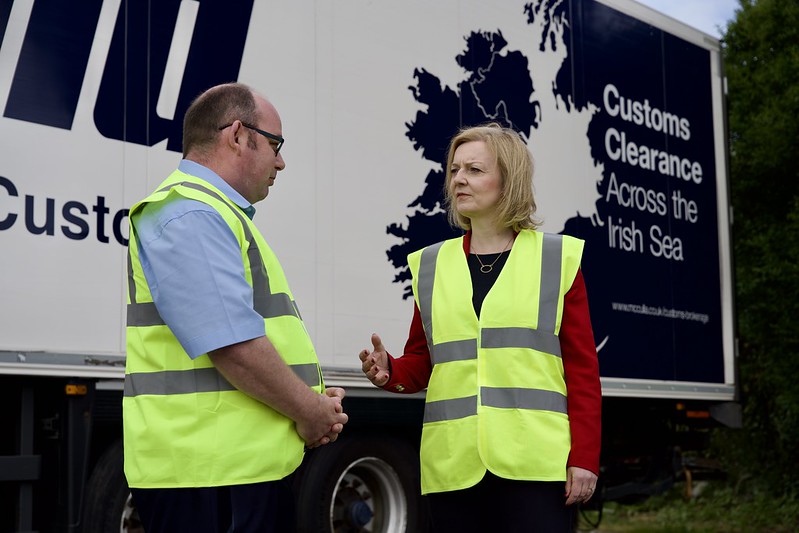Brexit & Beyond Newsletter
31 May 2022

Welcome to the 31 May 2022 Brexit & Beyond newsletter
The Northern Ireland Assembly was recalled yesterday. A delegation from the US Congress visited Parliament Buildings last week and met with party leaders to discuss the Protocol on Ireland/Northern Ireland and related issues. Liz Truss visited Northern Ireland to speak with businesses about the UK’s proposals on the Protocol. Representatives from local parties have given evidence to the Lords Sub-Committee on the Protocol. Minister Cleverly also gave evidence to the Lords Committee.
NI Assembly sitting
The Northern Ireland Assembly was recalled yesterday (30 May) to elect a Speaker following a petition signed by Sinn Féin, the SDLP and Alliance. The Assembly did not elect a Speaker, as this requires cross-community support and the DUP opposed the nominations. Many of the remarks in the chamber centred around issues relating to the Protocol on Ireland/Northern Ireland, the lack of a Speaker and functioning Assembly and Executive, as well as the cost of living crisis.

Monday’s sitting of the NI Assembly | Source: NI Assembly
Michelle O’Neill (Sinn Féin) told the chamber, “The majority of new MLAs elected to this Chamber support the protocol, believe that it is workable, if given the chance to be implemented, and believe that, where any issues exist, they can all be resolved within the framework of the protocol and the Joint Committee.” She said the news that Wrightbus had secured a deal to supply 60 hydrogen buses to Germany over the next two years “illustrates the benefits that our continued access to the EU single market is yielding for our local businesses, our economy and job creation.”
Paul Givan (DUP) said, “progress is being made…We were told that there would be no renegotiation of the protocol, and now the European Union recognises that change needs to come.” He stated, “I hope that we can get to a stage where the House is recalled, we elect a Speaker and we are able to form a new Executive. But the time for words is over. It is action that we need to see, and the UK Government have it within their gift to deliver that action. The European Union has it within its gift to make the changes that need to be made in order to have these institutions up and running on a power-sharing basis.”
Nuala McAllister (Alliance) said, “There is much talk today about the protocol for the unionist community and about issues for the unionist community, but the hardships right across Northern Ireland now are affecting not just one section of our community but everyone.” Robbie Butler (UUP) told MLAs, “I can attest that the DUP was clear on the doorsteps about not nominating for First Minister or, indeed, deputy First Minister without the protocol being addressed, but at no point was the matter of nominating for Speaker mentioned.” Matthew O’Toole (SDLP) commented that the number of MLAs who support the protocol increased at the last election. He said the DUP talks about “the failure of the unionist community and the people who elected you to offer consent for the protocol. I acknowledge that your party does not like the protocol. Do you acknowledge that my party and other parties in the Chamber have an equal objection to Brexit itself?” Jim Allister (TUV) said, “Unionism needs to hold its nerve. It is doing the right thing and, in doing so, has no option but to continue to repudiate and make clear that you cannot have the protocol and Stormont at the same time.”
US delegation meets NI party leaders
A delegation from the US Congress met with Northern Ireland’s main political parties in Parliament Buildings on Thursday. The bipartisan delegation of representatives has also held meetings in Dublin, London and Brussels. DUP leader Sir Jeffrey Donaldson said that he told US Congressman and Chair of the House Committee on Ways and Means Richard Neal that, “Not a single member elected to this Assembly can influence many of the laws that now oversee how we conduct trade in our country because they are imposed by the EU and there is no democratic accountability to this institution.” Donaldson said Neal’s visit was “the most undiplomatic” and the language used “unhelpful”. Sinn Féin Vice-President Michelle O’Neill welcomed the intervention from the US delegation, saying, “Successive American administrations have supported and nurtured our Good Friday Agreement for the past 24 years. Their continued support is very much welcome.” After his meeting with Neal, UUP leader Doug Beattie said Congressman Neal now understood unionist concerns about the Protocol. Alliance deputy leader Stephen Farry MP said his party asked the US delegation to “stress to the UK Government the need to build trust to work in partnership with the EU and avoid damaging unilateral action that makes that task harder”, and requested them “to continue to encourage [the EU] to go that extra mile in flexibilities, building upon their papers from October 2021, to achieve as many flexibilities and mitigations as possible.” SDLP Leader Colum Eastwood MP said their meeting was “productive…I acknowledge that unionism has a problem with the protocol. But the challenges we face are too important, they affect too many families, to allow government to be mothballed as part of a political strop.” In a statement following the meeting, Congressman Neal said, “The common thread between all the voices, as well as my own, was support for negotiated solutions to resolve challenges related to implementation of the Northern Ireland Protocol. We have urged parties to stay at the table and negotiate in good faith to sort out their differences.”

Congressman Richard Neal (right), with Cathaoirleach of Seanad Éireann Mark Daly | Source: Oireachtas
Congressman Richard Neal addressed Seanad Éireann earlier in the week, telling Senators, “We want to meet with people so that we can understand how the fallout from the UK's decision to leave the EU has affected all of them and us…A solution through an extended set of negotiations on Northern Ireland and Ireland can be enhanced. Any incautious move to undo the protocol, which was agreed to by all sides to address these issues, would put at risk this durable agreement [the Belfast/Good Friday Agreement] that we helped to create and which now we should all be celebrating.” Neal commented to the media in Dublin that, “The Protocol dispute seems to me to be a manufactured issue”. In response, DUP MLA Diane Dodds wrote to the Ways and Means Committee, saying, “to suggest the more than 40% of MLAs elected to the Northern Ireland Assembly less than 20 days ago were ‘manufacturing’ their opposition to the NI Protocol is outrageous.”
Liz Truss visits Northern Ireland
UK Foreign Secretary Liz Truss visited Northern Ireland on Wednesday 25 May. The UK Foreign Secretary wrote in the Irish Times that “The problems of the Northern Ireland protocol are baked into the text” adding that, “Without changes to this [the EU’s] mandate, we cannot fix the problems.” Visiting companies in Country Antrim, the Foreign Secretary said the Protocol issues are “soluble”. "We're not talking about scrapping it - we want to fix the issues but we simply can't allow the situation to drift," she added.

Foreign Secretary Liz Truss meeting local businesses in Belfast to discuss the Protocol | Source: UK Government/ FCDO
Proposals for GB-NI trade in goods
Truss was talking to businesses about the UK’s proposed solution of green and red channels for goods moving from GB to NI (with full checks and controls in the red channel to protect the EU single market). The European Commission previous proposed an ‘express lane’ for goods moving GB-NI, with “drastically reduced and simplified customs procedures”. [EU proposals put forward in October 2021 and ‘non-papers’ can be found here.] Road Haulage Association policy manager John Martin said that the UK’s proposal is the framework that the European Commission needs to agree to. Manufacturing NI raised concerns that the UK’s proposals for a dual regulatory system “will wipe out our agrifood producers and ultimately the rural community.” Ireland’s Minister for Foreign Affairs Simon Coveney said in the Dáil last week that the Irish Government is working with the European Commission “to try to ensure we respond to legitimate concerns in Northern Ireland, particularly on the issue of making a significant differentiation between goods we know are staying in Northern Ireland to be purchased and consumed there and those at risk of travelling into the EU Single Market, crossing the Border moving south. We can take a significant step forward in meeting the demands of many in the unionist community who want to see unnecessary checks gone on goods staying within the United Kingdom but, without a partner, it is hard to find a way forward.” CBI director general Tony Danker said thinks “there is a landing zone” on the Protocol issues, which is “eminently achievable”. He said, “The overwhelming majority of businesses want the Protocol to work,” adding, “one of our proposals around new discussions on the Protocol is how can we build in technical working groups with businesses around the table to design implementable solutions.” Sir Jeffrey Donaldson writes that “At minimum, these changes [proposed by the UK Government] must end the practice of laws being made for Northern Ireland by a government and legislature of which it is not a part and in which it has no representation. To depart from this would deal a fatal blow to the Good Friday Agreement.”
Local parties give evidence on the Protocol
On Wednesday 25 May, the House of Lords Protocol on Ireland/Northern Ireland Sub-Committee heard evidence from representatives from local parties as part of its follow-up inquiry on the impact of the Protocol on Ireland/Northern Ireland. The SDLP’s Matthew O'Toole pointed out that cross-community consent wasn’t sought for Brexit itself. His party wants to see the Protocol implemented as seamlessly as possible and he called for the UK Government to be a “responsible actor” in NI. He said that Northern Ireland is in some ways “sheltered” from the impacts of Brexit because of the Protocol, but highlighted disruption in other areas, for example barriers to trade in services North-South, and recognition of professional qualifications, which no longer operate in the same way. Asked where the EU’s proposals could go further, O’Toole said his party wants to see observer status for MLAs when relevant legislation is debated in the European Parliament, and representation in the Committee of the Regions: “That would enhance Northern Ireland’s visibility in Brussels and be a way of ensuring that people in Northern Ireland could see that their voice was being heard.”
Sorcha Eastwood of the Alliance Party also suggested that NI is in some ways “cushioned” from the impact of Brexit by the Protocol, and said it has a unique selling point with access to both the UK and EU markets. She said she thinks there has been an “evolution” of attitudes towards the Protocol. On the UK’s proposals for the Protocol, she remarked that a dual regulatory regime carries a huge risk, and said there isn’t a prevalent call for this in the business community. Alliance’s position is that negotiated, legal solutions are needed. Eastwood added that “a reset and clarity of purpose and of the parameters within which we are operating would be useful.”
Declan Kearney of Sinn Féin remarked that the Protocol is the “only and the best way to mitigate the worst effects of Brexit…it is a necessity.” He called for “good faith engagement” by the UK Government with the European Commission. Kearney also raised the issue of democratic engagement by Northern Ireland and the EU’s proposals on this. He said, “we need to ensure that the implementation of the Protocol gives due regard for the democratic input and participation of civic society and all parties in the north, especially, albeit that this is impossible at this juncture, the role of the northern Executive and Assembly.” He said ministers from NI have a minimised role in the governance bodies of the Protocol, adding, “it is a democratic deficit that we do not have the kind of access and are not given the opportunity and space to represent the needs, concerns and priorities of our business and agri-food sectors here.” Kearney said there is a need to ensure smooth and effective implementation of Protocol, asserting that none of current issues are beyond pragmatic resolution.
The Committee has issued a call for evidence for interested individuals and organisations to submit their views on the impact of the Protocol on Ireland/Northern Ireland. The deadline for written submissions is 9am on Monday 6 June 2022.
The Committee will hear evidence from the UUP and DUP on Wednesday 8 June.
Minister gives evidence on the Protocol
On Thursday 26 May, the Sub-Committee on the Protocol on Ireland/Northern Ireland took evidence from James Cleverly, Minister of State (Minister for Europe and North America) in the Foreign, Commonwealth and Development Office. The Minister said they have maintained a policy of “no surprises” with the EU, hence the announcement of its plan to legislate on the Protocol before the introduction of the Bill. He said they hope to progress the legislation in months rather than years, and it will be limited to certain areas which they see the need to address. Cleverly added that the Government is “keen to move quickly” and the first day back from recess (6 June) would be the earliest date for the Bill’s introduction.
The Minister said personal relationships with the EU negotiating team “remain cordial” and reiterated that the UK Government would like to see a negotiated solution. While there are no formal dates for meetings with the EU planned, Cleverly said there was no pushback from the EU to stop negotiations. He said the EU had responded with "disappointment rather than anger” to the UK’s unilateral plans. The Minister said the sticking point between the UK and EU is the “level of reassurance the EU seeks about the integrity of the single market.” He commented that the UK thinks it has proposals to manage this and said, “With a big dose of good will and trust, and a big dose of technology”, both the UK’s and EU’s concerns can be addressed.
Other news
- The Northern Ireland Life and Times (NILT) survey (carried out October-December 2021) was published on 30 May. Northern Ireland’s social policy hub, ARK, has published a research update on Political Attitudes in Northern Ireland after Brexit and under the Protocol since 2020, which considers this data.
- The UK Government has published the Intergovernmental Relations Quarterly Report for Q1 2022 on intergovernmental working between the UK Government, Welsh Government, Scottish Government and Northern Ireland Executive. It covers intergovernmental work on Common Frameworks and the UK Internal Market Act, and the Repeal of the EU (Withdrawal) Act section 12 ‘freezing powers’ in light of progress on Common Frameworks.
- The UK Government has introduced its Genetic Technology (Precision Breeding) Bill. The Government says, “Outside of the EU and free to set rules that work in the best interest of the UK, this Bill will enable the development and marketing of precision bred plants and animals which will drive economic growth and attract investment into agri-food research and innovation in the UK.” Under the Protocol, Northern Ireland will continue to follow EU rules in this area. Edwin Poots, Northern Ireland Agriculture Minister said, “This issue once again further highlights the unworkable nature of the Protocol for the agri-food sector.”
- The UK in a Changing Europe has published a commentary from Dr Brigid Fowler, Senior Researcher at the Hansard Society on the UK-EU Parliamentary Partnership Assembly (PPA)’s first meeting.
- The Equality Commission (ECNI), the Northern Ireland Human Rights Commission (NIHRC) and the Irish Human Rights and Equality Commission (IHREC) hosted an event on cross-border equality and human rights after Brexit, with a focus on minority ethnic groups, migrant people and border communities in the North-West region. Issues raised include concerns about access to cross-border services such as healthcare, education and work, and cross-border travel post-Brexit. The Commissions encourage anyone who has a concern that their equality or human rights may have been affected as a result of Brexit to contact them directly for advice.



